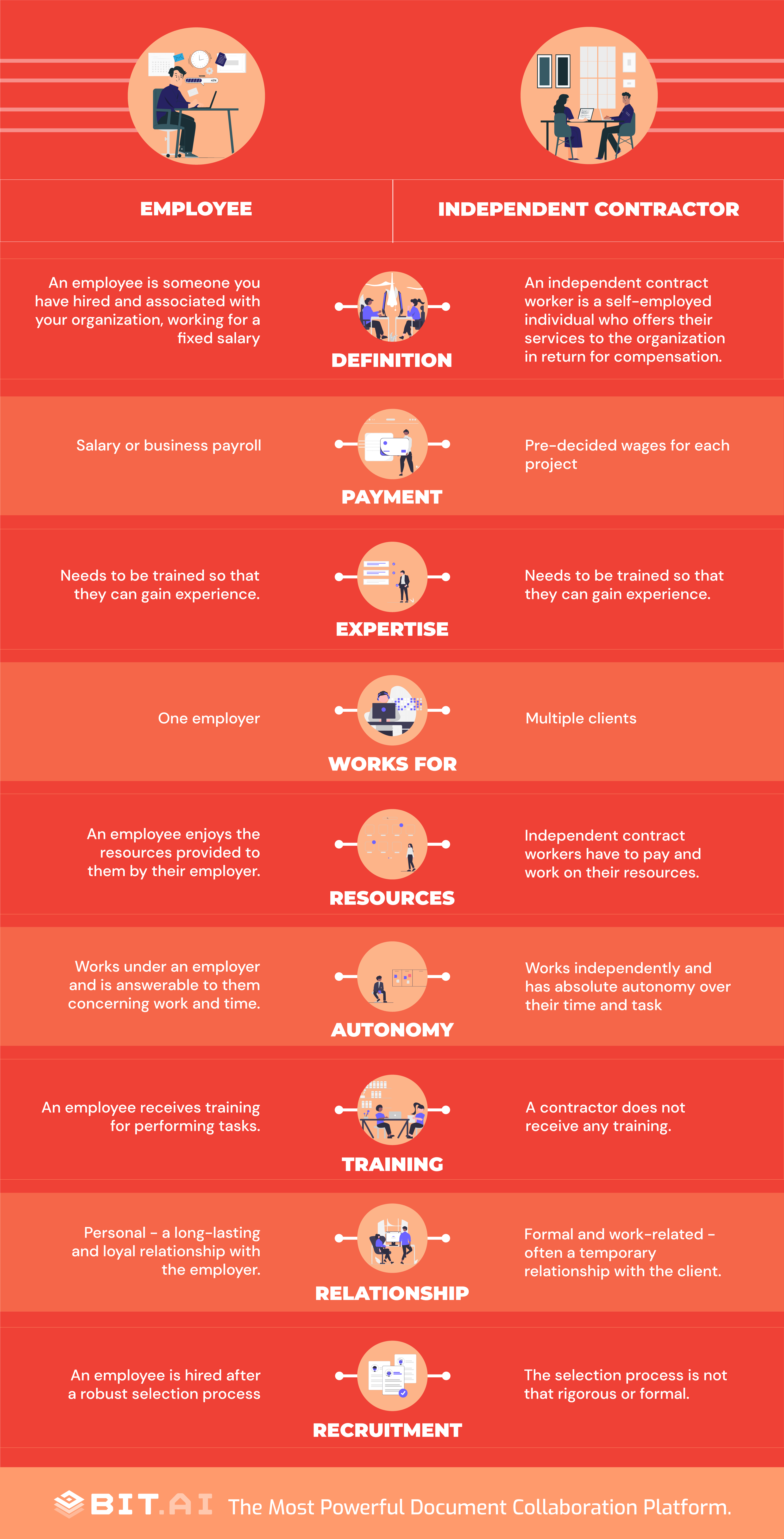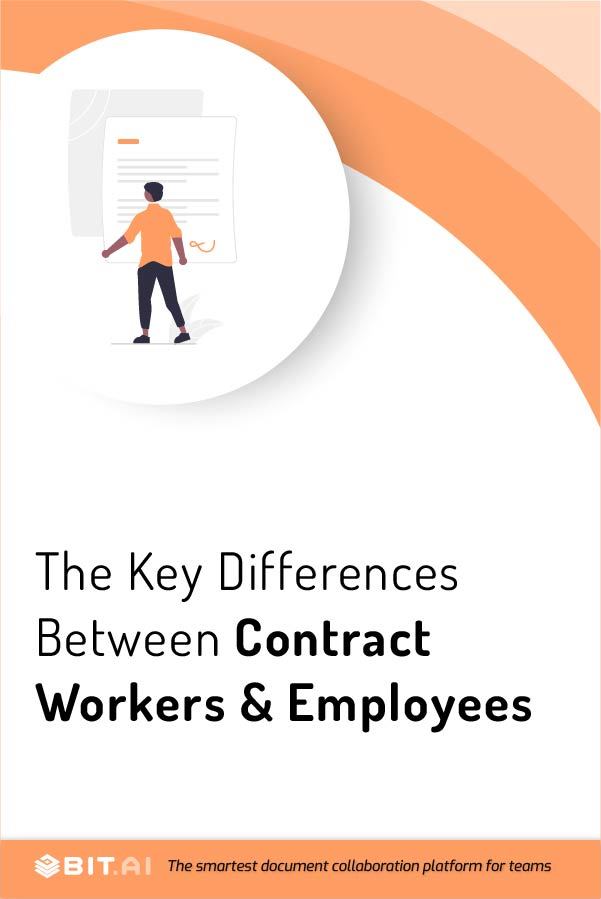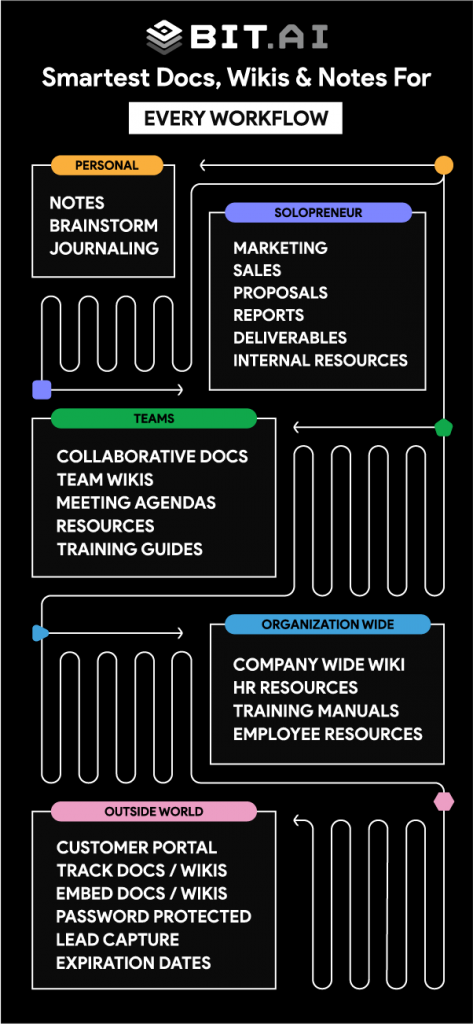The truth is that hiring an independent contract worker saves your business a bucket load of money than hiring an employee. Then why hire an employee at all, you wonder right?
Well, the fact is that choosing to hire a contract worker comes with its own set of limitations, challenges, and risks. Sure, you may think you can manage some of the risks and limitations if you can save some money, but in the long run, it may not be right for the functioning of your organization.
So the question remains: Is hiring an employee or an independent contractor better? To answer that you need to understand the key differences between the two.
If you want to learn the primary differences between contractor workers and employees so you can hire the right type of workers for your business, this blog post is perfect for you! Let’s get started!
Who is an Independent Contract Worker?
An independent contract worker is a self-employed individual who offers their services to the organization in return for compensation. These services are on a project-to-project basis, for which they are paid individually, and the rules and regulations of the organization do not bind the independent worker.
Contract workers do not get regular salaries from the organization or any other associated benefits. The terms and conditions and compensation are pre-decided and discussed for each project. They also have more autonomy over their work as no one from the organization supervises them.
 Independent contract workers are only given certain projects according to their skills and experience, and they purely work on those. An example of an independent contract worker is a freelance content writer. They can be hired to write a given number of articles for the organization and are paid for each.
Independent contract workers are only given certain projects according to their skills and experience, and they purely work on those. An example of an independent contract worker is a freelance content writer. They can be hired to write a given number of articles for the organization and are paid for each.
Who is an Employee?
An employee is someone you have hired and associated with your organization, working for a fixed salary. They work under certain terms and conditions pre-decided by the employee and the employer, either orally or formally in writing.
An employee gives a certain number of hours to the company regularly and works on the different tasks assigned to them by the employer. The rules and regulations of the organization also bind them.
For example, imagine a professional content writer hired by an organization to write regular articles for them, for which he/she is paid monthly.
 The work can vary from one project to another and the employee, and the employee has to do work accordingly. These employees are a part of the organization, which means they cannot associate with other companies/organizations. The employee also enjoys other benefits associated with the organization, like bonuses, leaves, national holidays, etc.
The work can vary from one project to another and the employee, and the employee has to do work accordingly. These employees are a part of the organization, which means they cannot associate with other companies/organizations. The employee also enjoys other benefits associated with the organization, like bonuses, leaves, national holidays, etc.
Having understood the basic characteristics of an employee and an individual contract worker, let us analyze their key differences to understand which one might be more suitable for the task you have in mind.
Key Differences Between Contract Workers vs Employees
1. Payment
The most significant difference between an independent contract worker and an employee is the money they are paid and how it is taxed. The employee gets a business payroll, where the organization pays them the hourly wages while deducting the taxes. In some cases, they are also given other benefits, like health insurance, paid vacation, etc.
On the other hand, an independent contract worker is only paid a pre-decided wage that was discussed between them and the organization. There are no tax deductions, as the independent contractor is responsible for paying his taxes. The payments made to the independent contract worker is called an invoice, which might differ from project to project. The mode of payment and timing are also discussed beforehand to ensure efficiency.
2. Relationship
An employer’s relationship with an employee and an independent contract worker differs significantly. While an employee works under the employer’s supervision, who decides their tasks, deadlines, day-to-day progress, and overall development, an independent contract worker has no such supervision and works with more autonomy. Their relationship with the employer is purely formal and work-related.
An employer is more concerned about their employees’ needs and sometimes even personal lives to ensure they are healthy and motivated to give their best to the organization. A good camaraderie between an employee and employer leads to better work efficiency and makes the employees more loyal. An independent contract worker, on the other, has little to no relationship with the employer apart from the work.
3. Expertise
Independent contract workers have specialized skills and expertise that make them valuable to any organization. Because of their specialized skills, an organization hires them for a project. On the other hand, an employee needs to be trained to gain experience before they start working on the projects. Initially, an employee must also be handheld to ensure they know the task and can give their best.
An independent contract worker comes in ready with the skills and experience to ensure the smooth completion of the task. They understand their role and responsibility and don’t need supervision as they are adept at their work, making them a boon for any organization.
4. Autonomy
A major contrast between an employee and an independent contract worker is autonomy. While an independent contract worker has absolute autonomy over their time and task, an employee is answerable to the employer concerning their work and time.
An independent contract worker can choose when to work, how to finish the task, and the resources to be used. On the other hand, an employee has a fixed daily schedule within which they have to work, their tasks are also managed, and it is ensured that they don’t slack off and work for the stipulated amount of time every day.
The employer also decides an employee’s tasks and projects, while an independent contract worker can choose their projects on convenience. The employee also has a specific pre-decided schedule within which they have to report to the office and leave at the end of a shift, while an independent contract worker can decide their own schedule and work timings.
5. Time off
The leaves and vacations that an employee gets are decided by their employer. They are granted some casual leaves, vacation leaves, sick leaves, etc. The employees must also inform and take the permission and approval of the employer before taking any of these leaves. They are also given holidays on festive occasions and other national holidays.
On the other hand, independent contract workers have complete autonomy over their time offs. They can decide when to take a break from work on their own. They don’t need permission or approval from anybody, as they have complete autonomy over their time and projects. Depending on their needs, they can work on holidays and take a break on weekdays.
6. Resources
An employee enjoys the resources provided to them by their employer. They are hired for their work, and the employer is responsible for providing them with all the resources they need for work. This would include office space, a laptop/ computer, software they might need for work, etc.
The employer cannot provide any such resources for the independent contract worker. They have to pay and work on their resources. All the employer has to do is provide them with the task and remuneration. The worker has to work on their resources and give the output required.
Read More: How Bit.ai Makes a Freelancer’s Life Easy?
7. Other Work
An independent contract worker can take on multiple projects depending on their needs and capabilities. Just because they have been handed a certain project from one company does not mean that they cannot take on a different project from another organization. As long as they can deliver the projects on time, they can take up as many projects as they want and associate with as many organizations as they want.
The same cannot be said about an employee. Employees are contractually bound to the organization they are working for; they cannot take any other projects from a different organization, as it is unethical and illegal. They work on the tasks assigned to them by their employer and cannot take up any other projects from any other company as long as they are working for that organization.
8. Hiring Process
 An employee is hired after a robust selection process, where the potential employee applies for the job vacancy through a resume and then has to clear the interview. The HR finally hires the employee, and they have to provide their documents for verification and sometimes sign a contract with the organization.
An employee is hired after a robust selection process, where the potential employee applies for the job vacancy through a resume and then has to clear the interview. The HR finally hires the employee, and they have to provide their documents for verification and sometimes sign a contract with the organization.
An independent contract worker is only hired for specific projects and tasks, so the selection process is not rigorous or formal. They can be hired by a team/supervisor within the organization and have to report to them. They are directly hired and don’t have to undergo a selection process or provide any document verification. They do have to sign a contract, though, about their exact task and role, along with their remuneration details.
9. Onboarding and Training
Since independent contract workers are expected to focus on a specific project, they’re only given the data and information needed for completing that particular task or project. No additional training is given to them. On the other hand, employees are given a detailed onboarding process with proper training and development to help them understand the company culture, team dynamics, roles and responsibilities, and overall company goals.
Read More: How to Ace the New Hire Onboarding Process?
Conclusion!
In short, it can be said that several differences are associated between an employee and an independent contractor. But at the end of the day, both contract workers and full-time employees can serve as good choices to fulfill a small business’s different projects and needs.
The cost of maintaining employees is higher than independent contractors because of the need to pay. So before coming to a decision, you need first to realize = your requirements and expectations, and then choose the right type of person for the task. Good luck!

Loved the content? Here are a few more blog posts that might you like too!
Freelance Contract: What is it & How to write it?
Employee Training: Definition, Importance & Tools to Use!
Best Employee Onboarding Tools Out There!
Employee Training Software and Tools for Efficient Employees!
Onboarding Checklist: What is it & How to Create it?
Service Contract: What is it and How to Draft a Perfect One?

Related posts
Bit.ai | Watch to Learn More
What is Bit.ai?
Bit.ai is an innovative AI-driven knowledge and Document Managment suite designed to empower knowledge workers by streamlining the creation of, documents, wikis, and notes. With an intuitive interface and seamless integration, Bit.ai acts as a versatile assistant to help you collaborate, generate, organize, and visualize your ideas effortlessly. Whether you are drafting a report, managing a project, collaborating with your team or clients, or brainstorming new concepts, Bit.ai brings intelligence and creativity to every aspect of your work process.


